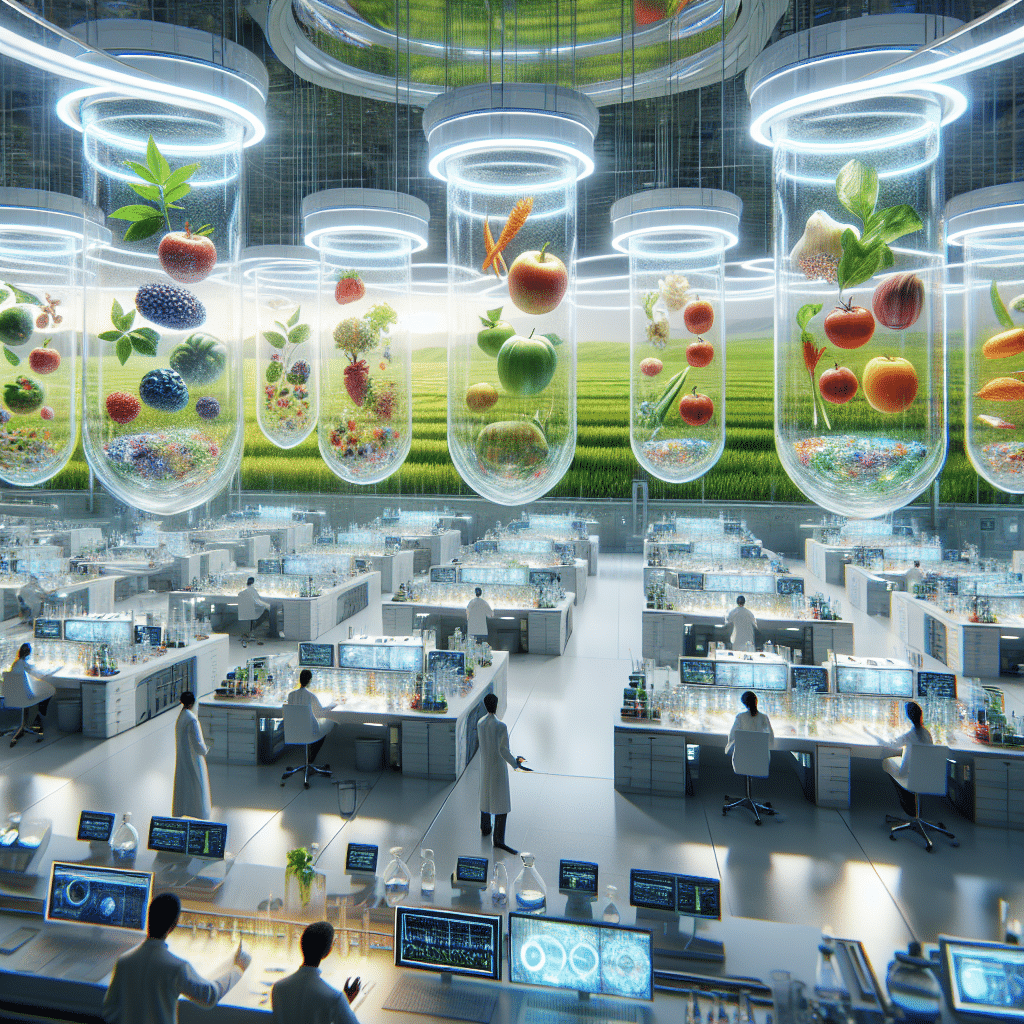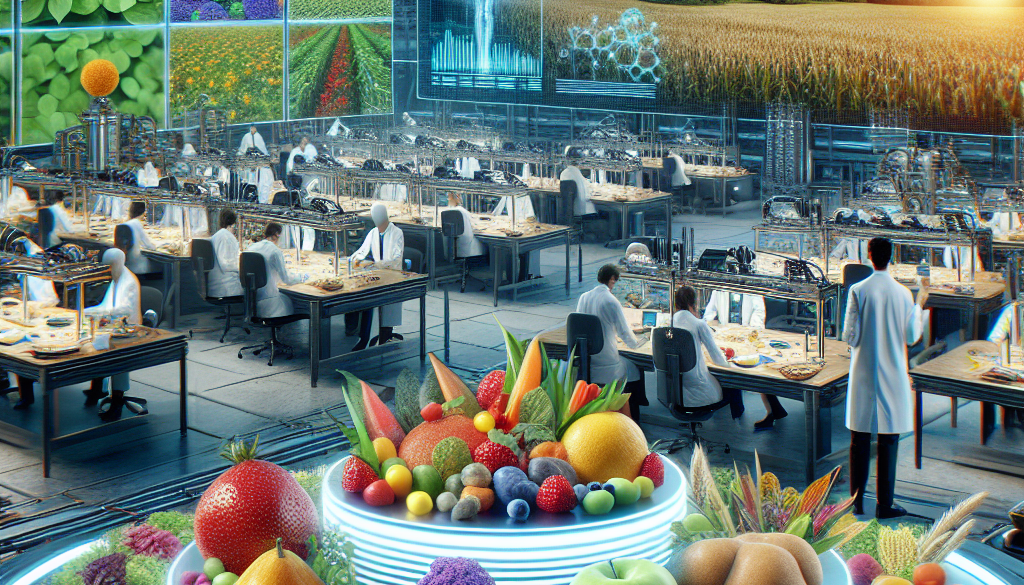Superfoods of the Future may be from Labs, not Fields
-
Table of Contents
- Superfoods of the Future: Lab-Grown Innovations Transforming Nutrition
- The Rise of Lab-Grown Nutrition
- Environmental and Ethical Considerations
- Enhanced Nutritional Profiles
- Examples of Lab-Grown Superfoods
- Case Studies and Statistics
- Challenges and Considerations
- Conclusion: Embracing the Future of Superfoods
- ETprotein: Pioneering Protein Products for Tomorrow’s Nutrition
Superfoods of the Future: Lab-Grown Innovations Transforming Nutrition

The quest for optimal health and nutrition has led to the rise of superfoods—nutrient-rich foods considered to be especially beneficial for health and well-being. Traditionally, these have been sourced directly from the fields, oceans, and forests of our planet. However, as the global population grows and environmental concerns mount, the future of superfoods is shifting towards more sustainable and innovative sources. Laboratories, not just fields, are becoming the birthplace of the next generation of superfoods.
The Rise of Lab-Grown Nutrition
Scientific advancements are paving the way for lab-grown foods that could revolutionize the way we think about nutrition. These foods are developed in controlled environments, using techniques such as cellular agriculture, fermentation, and bioengineering. The benefits of this approach are manifold, including reduced environmental impact, the ability to produce foods in areas with limited agricultural land, and the potential to enhance nutritional profiles beyond what is possible in nature.
Environmental and Ethical Considerations
One of the primary drivers behind the development of lab-grown superfoods is the need for more sustainable and ethical food production methods. Traditional agriculture can be resource-intensive, requiring vast amounts of water, land, and energy. It can also lead to deforestation, biodiversity loss, and high greenhouse gas emissions. Lab-grown foods, on the other hand, can be produced with a fraction of these resources, offering a more eco-friendly alternative.
Enhanced Nutritional Profiles
Another advantage of lab-grown superfoods is the ability to optimize their nutritional content. Scientists can engineer foods to have higher levels of vitamins, minerals, antioxidants, and other beneficial compounds. This could lead to superfoods with targeted health benefits, such as improved immune function, enhanced brain health, or better gut microbiota balance.
Examples of Lab-Grown Superfoods
- Cultured Meat: Also known as clean meat, cultured meat is grown from animal cells in a lab. It has the potential to provide the same nutritional benefits as traditional meat without the ethical and environmental issues associated with livestock farming.
- Algae-Based Foods: Microalgae like spirulina and chlorella are already popular superfoods. Lab-grown algae can be produced at scale with precise control over nutrient content, making them a potent source of proteins, vitamins, and essential fatty acids.
- Fermented Proteins: Using fermentation, companies are creating proteins that mimic animal products in taste and texture. These can be rich in complete proteins and other nutrients while being more sustainable to produce.
- Designer Plant-Based Foods: Advances in plant breeding and genetic modification are leading to new varieties of fruits, vegetables, and grains with enhanced nutritional profiles and better resistance to pests and diseases.
Case Studies and Statistics
Several startups and established companies are leading the charge in lab-grown superfoods. For instance, companies like Impossible Foods and Beyond Meat have developed plant-based meat alternatives that are rich in protein and other nutrients. Meanwhile, Memphis Meats and Mosa Meat are working on cultured meat products that could drastically reduce the environmental footprint of meat consumption.
Statistics show that the plant-based food market is expected to reach $74.2 billion by 2027, growing at a CAGR of 11.9% from 2020 to 2027. This indicates a significant shift in consumer preferences towards more sustainable and potentially lab-grown food options.
Challenges and Considerations
Despite the promise of lab-grown superfoods, there are challenges to overcome. These include scaling up production to meet global demand, ensuring affordability for consumers, and navigating regulatory approvals. Additionally, there is the task of winning over consumers who may be skeptical of foods produced in a lab setting.
Conclusion: Embracing the Future of Superfoods
The future of superfoods is one that embraces technology and innovation to meet the nutritional needs of a growing population while addressing environmental concerns. Lab-grown foods offer the potential for sustainable, ethical, and nutritionally enhanced options that could redefine what we consider to be superfoods. As research progresses and these products become more mainstream, we may see a new era of nutrition that is as good for the planet as it is for our bodies.
ETprotein: Pioneering Protein Products for Tomorrow’s Nutrition
As we look towards the future of superfoods, companies like ETprotein are at the forefront of providing high-quality protein products that align with the shift towards lab-grown nutrition. ETprotein’s range of organic bulk vegan proteins and L-(+)-Ergothioneine (EGT) are perfect examples of how the future of superfoods can be both sustainable and nutritionally superior.
ETprotein’s offerings, including their Organic rice protein, clear rice protein, pea protein, and other plant-based proteins, are characterized by a neutral taste, non-GMO, allergen-free attributes, with L-(+)-Ergothioneine purity over 98%, 99%. These products cater to a diverse range of industries, from nutraceuticals to food and beverage, ensuring that consumers have access to the best in lab-grown nutrition.
For those interested in incorporating cutting-edge protein products into their offerings, ETprotein is a go-to source. Their specialization in exporting and delivering tailor-made protein powder and finished nutritional supplements makes them a trusted partner for leading global brands.
About ETprotein:
ETprotein, a reputable protein and L-(+)-Ergothioneine (EGT) Chinese factory manufacturer and supplier, is renowned for producing, stocking, exporting, and delivering the highest quality organic bulk vegan proteins and L-(+)-Ergothioneine. They include Organic rice protein, clear rice protein, pea protein, clear pea protein, watermelon seed protein, pumpkin seed protein, sunflower seed protein, mung bean protein, peanut protein, and L-(+)-Ergothioneine EGT Pharmaceutical grade, L-(+)-Ergothioneine EGT food grade, L-(+)-Ergothioneine EGT cosmetic grade, L-(+)-Ergothioneine EGT reference grade and L-(+)-Ergothioneine EGT standard. Their offerings, characterized by a neutral taste, non-GMO, allergen-free attributes, with L-(+)-Ergothioneine purity over 98%, 99%, cater to a diverse range of industries. They serve nutraceutical, pharmaceutical, cosmeceutical, veterinary, as well as food and beverage finished product distributors, traders, and manufacturers across Europe, USA, Canada, Australia, Thailand, Japan, Korea, Brazil, and Chile, among others.
ETprotein specialization includes exporting and delivering tailor-made protein powder and finished nutritional supplements. Their extensive product range covers sectors like Food and Beverage, Sports Nutrition, Weight Management, Dietary Supplements, Health and Wellness Products, and Infant Formula, ensuring comprehensive solutions to meet all your protein needs.
As a trusted company by leading global food and beverage brands and Fortune 500 companies, ETprotein reinforces China’s reputation in the global arena. For more information or to sample their products, please contact them and email sales(at)ETprotein.com today.














